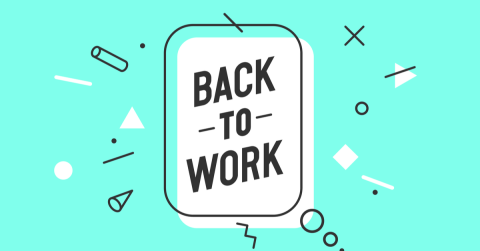
A time off work can be a great opportunity to rest, spend time with your loved ones, or travel. However, you may want to make a plan to work through an adjustment period after returning from your holiday. Yes, It's a great holiday and all you want is to rest or maybe have fun but there are a few things to consider as the best practices to ensure a productive and effortless return from a well-deserved holiday. In this article, we share how to get back to work after a holiday.
Why should you prepare for coming back to work after a long holiday?
Being prepared to return to work after a holiday can ensure a smooth transition period and help you return to your usual productivity level. Here are some other benefits of preparing to return to work:
-
Encourages confidence. Being prepared can help you feel confident about returning to work and ready to accomplish your daily work goals.
-
Ensures productivity. Preparing a plan to help you return to your regular working habits can help you stay focused and motivated.
-
Opens communication. Communicating with your manager about coming back to work allows them to update you on any changes that occurred in your workplace during your vacation.
-
Maintains a positive attitude. Because your preparations can keep you focused and on a schedule, having a clear plan for coming back to work can help maintain a positive attitude about the workday.
Going back to work after this holiday bliss to productive work can be a jarring transition. Happily, with the holidays approaching, we’ve got you covered. Here are some tips — from the night before, to the end of your first day back — to help make your re-entry to work less painful and more productive.
 1. Check emails the night before (maybe!)
1. Check emails the night before (maybe!)
There are two distinct schools of thought on this. Some people find it helpful to screen their emails the evening before — both to ease their evening-before peace of mind, and also to improve their first-day-back productivity. Other people feel that the evening before their first day back is still part of their holiday time and decide against checking their inbox. Find the strategy that works best for you and stick to it with intention.
2. Plan ahead for a good morning
If you’ve been living in your PJs for a week or two, a morning rush to work can get your day off on entirely the wrong foot. Make your morning easier by putting together a go-bag. Prepare your lunch and snacks, set out the clothes you’ll wear, and gather up whatever work you may have brought home with you. All these things will make your morning run smoothly and will improve your performance on your first day back after Christmas.
3. Get a good night’s sleep
There’s an abundance of research showing that focus and performance drop dramatically with lost sleep and that sleep deprivation can have disastrous effects on your physical health as well. Turn off any screens in good time, use relaxation strategies that work for you, and go to bed early to ensure you’ll wake up feeling rested and ready.
4. Get organized
If you left your desk in a state of disarray (we won’t judge — most of us don’t have time to organise our desks on the last day before the holidays), set yourself up for success by tidying up before you start working on anything. Straighten up any unnecessary piles of paper and folders and set them aside for later. Clearing your clutter clears your mind, and in turn, means you’ll be able to manage your time without being distracted by the mess.
5. Set goals and write them down
On your return to work after the holidays, it’s especially important to set goals and hold yourself accountable for reaching them. The number and type of goals you set will depend entirely on your work, but keep them achievable so you can reward yourself with a sense of accomplishment. Write the most important things down and cross them off as you get them finished. Stick with one goal until it’s finished — multitasking may seem more productive, but in fact, the reverse is true.
6. Check in with work social media feeds
During one of your breaks from work, check in with your work-related social media feeds (if you use them to stay current on news and developments in your line of work and industry). Doing this intentionally during a break will help you resist the temptation to check in mindlessly during the day — particularly in a moment when your mind is seeking a fun distraction from work.
7. After checking, turn all social media off
Keep your phone on silent with the screen down so you won’t be distracted by notifications and alerts throughout the day. Social media is the easiest and most tempting way to spend time doing anything other than work. Turn off the distractions so you won’t let yourself get pulled down that rabbit hole.
8. Consider a 'delay' message
If you’re spending your first day back clearing a backlog, your response time to new messages may be slower. Consider setting up an auto-response to new emails committing to a reply shortly — for example, within 24 hours. This quick and easy step gives you the permission to focus on catching up, without the distracting pressure to read and reply to emails right away. You can still respond to critical and time-sensitive emails when you see them during a scheduled email check, which we’ll cover below.
9. Eat well
No matter how busy you are, resist the temptation to work through lunch. The benefit of any small amount of time you save will be far outweighed by a drop in your cognitive abilities. When you take breaks during the day, top up your tank with healthy snacks. To stay focused and productive, your brain needs the energy that food provides. In particular, choose foods that will keep your body and brain running steadily without energy spikes and slumps.
10. Drink lots of water
Your brain also needs water to be at its best — after all, your brain is 3/4 water! Just a 4% drop in hydration can result in a productivity drop of up to 50%. Bring a water bottle with you to work and keep it in a prominently visible spot in your workspace to remind yourself to drink regularly throughout the day.
11. Triage your inbox
Some emails in your inbox will probably need relatively immediate attention. For others, action might be required, but it can wait until later. Many, almost certainly, are just ‘FYI’ emails that require no action but that you may need to review at some point. And of course, there are bound to be many that require no action or review at all. As quickly as you can, cut down on the size of your inbox by triaging your emails — perhaps organizing them in folders that represent the action you need (or don’t need) to take.
12. Delete (or archive) ruthlessly
If your inbox looks anything like ours, it collects emails that are entirely unnecessary. Mailing lists that we signed up for (or, in some cases, didn’t), emails that we were copied in on for some inscrutable reason, jokes, and links to funny videos. At other times of the year, there may be time to sift through these when we need a distraction. Now is not the time. Be ruthless and delete as many of these irrelevant messages as you can — or at least archive them to look at later. Most importantly, get them out of your inbox: out of sight is out of mind.
13. Schedule new email checks
Since you’ve set an auto-response letting people know there might be a delay with your reply (you did that, right?), keep your focus on the goals you’ve set by allowing new emails to arrive without immediately reading them. Set aside some time — perhaps just before or just after one of your planned breaks — to read new emails that have arrived, and triage them in the same way as you did the others. It’s easy to fall into the habit of responding to an email just because it’s there. Keep prioritizing them to avoid this productivity drain and to remain focused.
14. Plan breaks
Human brains simply cannot focus effectively for long periods of time without a break. The Pomodoro technique provides a healthy structure for you to concentrate on the tasks at hand for a sustainable amount of time, and then to give your brain the breathing space it needs to regroup for the next session. Using this technique, work for 25 minutes at a time, with a 5-minute break after each work period. After you’ve completed four of these 25-minute sessions, give yourself a longer break — 15–30 minutes — to fully recharge your batteries.
15. Reconnect with people — intelligently
Assuming that you like the people you work with as much as we do, the first day back can be a lot of fun. You haven’t seen these folks for a week or so, everyone’s had a lot of fun while away, and it’s nice to catch up on the stories of holiday merriment. At the risk of being a post-holiday Grinch, these conversations can be the biggest drag on time and productivity during the first day back. Do plan to reconnect with the people you like and enjoy working with. Just do it during the breaks you’ve planned for yourself and remember to be respectful of their time and focus!
Guess What?!
Holiday breaks are an important part of your working year. No matter how much we love our jobs, we all need time away from them from time to time. Holidays give us the quality time we need with loved ones, and the time our brains require to recharge and keep us performing at our best while feeling refreshed. After a holiday, we can return to our jobs feeling stress-free and ready to take on the challenges we face each day.
Your first few days back in the office after a holiday can be less frantic and more productive if you use these tips to plan ahead and follow through. By the time your first day back comes to an end, you’ll almost certainly feel back in the groove and routine of work. That Friday, take a moment to reflect, pat yourself on the back for reaching the goals you set, and enjoy your well-deserved weekend.